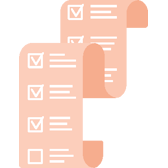Midyear Reboot: Five Strategies for Building Effective Habits
Attention Magazine February 2024
As we approach the midpoint of the school year, many parents notice that their children are less motivated and less engaged than they were in September. Perhaps their grades were disappointing or they struggled socially. If they’re in middle or high school, they may have changed schedules and teachers and are dealing with new experiences daily despite a general sense of blah.

Developing new habits in order to set themselves up for success both in and out of school is what’s called for. This is a great opportunity to pivot and create habits that promote positivity and success. Even though change can be tough, doing the same thing that isn’t working likely results in defeat.
Let’s take a closer look at how to help your ADHD child or adolescent develop effective habits which will support and sustain them as they plough through the spring semester.
The importance of developing good habits
We usually develop habits to help us to lower stress or meet an emotional need. They may serve us when we start them and then cease to be useful. Part of parenting is helping our children develop good habits and break ineffective ones. Old habits are tough to break because they are familiar, easy to do, and feel safe: often, they are connected to beliefs we have about ourselves, too.
Replacing old habits with newer, more useful ones takes patience and time, but is well worth the effort. It involves setting a goal, doing it daily (no matter how small), and setting up collaborative incentives to encourage your child to keep it at. Shifting to and maintaining healthy routines helps your child keep up with schoolwork, fulfill family responsibilities, and manage their overall health.
For example, if your ADHD child fell into a vacation pattern of late-night gaming, it’s time to switch to a more constructive routine. Replacing the old gaming pattern with a new routine that involves earlier bedtime and less screen time ensures your youngster gets plenty of rest and is able to better focus on schoolwork.
Change and a growth mindset
The process of change relies on both you and your child having a growth mindset. A growth mindset establishes that being human means that living necessarily involves learning: you will make mistakes, and, instead of berating yourself or your kids for their fumbles, you pause, regroup and tweak what you are doing. It’s this capacity to pivot that encourages us to keep going and keep growing. You’ll want to use strength-based thinking, meaningful incentives, and practical routines instead of punishment and ‘because I said so’ reasoning.
Developing new habits takes practice—lots of it—across time, especially if we are trying to undo something that’s familiar, even if it’s not working. Forming new ones is a team effort based on collaboration and consistency with both you and your child putting in the work.
Five strategies for creating new habits
 As parents or caregivers, we aim to teach kids lifelong skills so they can be more efficient and effective in the tasks of daily living and develop connected independence. Most people can only change one thing at a time. This means finding ways to manage your stress, stay focused, and, most importantly, treat yourself with compassion. Use the 5Cs of ADHD (self-Control, Compassion, Collaboration, Consistency and Celebration) to stay on track. Keep the conversation short and focused: no more than twenty minutes for teens and ten minutes for elementary school age children.
As parents or caregivers, we aim to teach kids lifelong skills so they can be more efficient and effective in the tasks of daily living and develop connected independence. Most people can only change one thing at a time. This means finding ways to manage your stress, stay focused, and, most importantly, treat yourself with compassion. Use the 5Cs of ADHD (self-Control, Compassion, Collaboration, Consistency and Celebration) to stay on track. Keep the conversation short and focused: no more than twenty minutes for teens and ten minutes for elementary school age children.
1 Manage yourself first.
 Before you can help your child, set yourself up for success first. Take a few moments to reflect on what habits you might want to change in your family routines and for yourself, too. Pick one thing from each category. Stay neutral and calm during the conversation, offering empathy and encouragement, while reflecting back what you hear. This isn’t really the time for advice. Instead, this is a moment for your family to tweak what’s been going on this fall and make things even better.
Before you can help your child, set yourself up for success first. Take a few moments to reflect on what habits you might want to change in your family routines and for yourself, too. Pick one thing from each category. Stay neutral and calm during the conversation, offering empathy and encouragement, while reflecting back what you hear. This isn’t really the time for advice. Instead, this is a moment for your family to tweak what’s been going on this fall and make things even better.
If you know that certain things trigger and frustrate you, plan for them to lower their influence and set up an out to cool off. Going to the bathroom is my favorite option. Pick a time to chat when your child or teen is fed and awake. Plan on brainstorming together what are the two habits that your child or teen wants to change and bring in the two that you want. Then pick the overlapping one to work on first.
2 Set goals with your child.
 When you take a collaborative approach on problem-solving, you increase your child’s cooperation. Explain to your child why building healthy habits and routines is important to THEM and ask them for their thoughts and suggestions. Use “We” instead of “You” when discussing habits to emphasize that you and your child are on the same team and working toward the same goal.
When you take a collaborative approach on problem-solving, you increase your child’s cooperation. Explain to your child why building healthy habits and routines is important to THEM and ask them for their thoughts and suggestions. Use “We” instead of “You” when discussing habits to emphasize that you and your child are on the same team and working toward the same goal.
Find a way to frame the need for habit-building as a benefit to your child. For example, you can say: “Preparing your backpack and clothes the night before means you are less likely to forget something or run around in a panic looking for it when it’s time to get to the bus before school.”
3 Create simple, specific routines.
 In order to build new habits, you’ll need to set up specific, age-appropriate routines that your child or teen is actually capable of doing. Habits are built from cues, behaviors, and the repetition of these behaviors until the routine becomes second nature.
In order to build new habits, you’ll need to set up specific, age-appropriate routines that your child or teen is actually capable of doing. Habits are built from cues, behaviors, and the repetition of these behaviors until the routine becomes second nature.
For example, you can use a specific song as a cue for a young child who needs help with a bedtime routine of brushing teeth, putting on pajamas, and tidying up before bed. Older kids could use reminders, lists or alarms to signal the start of homework time. Some families find using technological aids such as Alexa can be effective. Make things as specific as possible so there are no assumptions or surprises. Start small and simple, don’t overcomplicate things, and build on what works.
4 Use incentives instead of punishments.
 The carrot is more effective than the stick, especially for kids and teens who have ADHD. Punishments do not work and drive a wedge between you and your child. They don’t teach any skills, and kids with ADHD need executive functioning skill instruction.
The carrot is more effective than the stick, especially for kids and teens who have ADHD. Punishments do not work and drive a wedge between you and your child. They don’t teach any skills, and kids with ADHD need executive functioning skill instruction.
Effective and meaningful incentives offer motivation and encouragement for your child to make competent choices. Try letting them earn extra screen time by completing homework first. Or maybe they can hang out with their friends during the weekend after their chores have been completed. Put the have-tos before the want-tos for them now, so they learn how to do this for themselves later.
Aim for frank conversations based on meeting them where they are and asking them to brainstorm with you for solving problems. Give them a chance to take responsibility and then guide them as they learn.
5 Plan for pushback and adjustments.
 Your child may be willing to take on a new routine at first, but may not stick with it, or may find that it just doesn’t work in practice. Plan for habit-building success by anticipating some amount of pushback and having alternative options at the ready. Chances are it will take some trial and error before you and your child find a routine that works.
Your child may be willing to take on a new routine at first, but may not stick with it, or may find that it just doesn’t work in practice. Plan for habit-building success by anticipating some amount of pushback and having alternative options at the ready. Chances are it will take some trial and error before you and your child find a routine that works.
Set up fallback plans in advance. When the pushback tries your patience, practice breathing techniques, take a short walk, and use the bathroom to regain your center. Remember even incremental successes are worth celebrating. Be generous with your praise and celebrate what’s working.
Helping your child or teen to form new habits and your family to follow new routines takes time and practice, stumbling and regrouping. Even when frustration mounts, remind yourself that instilling effective routines and healthy habits in your child or teen will guide them for many years to come. Use a growth mindset, pivot, and try again.


 Sharon Saline, PsyD, clinical psychologist and author of What Your ADHD Child Wishes You Knew: Working Together to Empower Kids for Success in School and Life and The ADHD Solution card deck, specializes in working with children, teens, young adults and families living with ADHD, learning disabilities, twice exceptionality and mental health issues. With decades of experience as a clinical psychologist and educator/clinician consultant, she guides families and adults toward effective communication, closer connections and greater understanding. She lectures and facilitates workshops internationally on topics such as ADHD and neurodivergence, executive functioning, the anxiety spectrum, motivation, perfectionism and working with different kinds of learners. Dr. Saline is a regular contributor to
Sharon Saline, PsyD, clinical psychologist and author of What Your ADHD Child Wishes You Knew: Working Together to Empower Kids for Success in School and Life and The ADHD Solution card deck, specializes in working with children, teens, young adults and families living with ADHD, learning disabilities, twice exceptionality and mental health issues. With decades of experience as a clinical psychologist and educator/clinician consultant, she guides families and adults toward effective communication, closer connections and greater understanding. She lectures and facilitates workshops internationally on topics such as ADHD and neurodivergence, executive functioning, the anxiety spectrum, motivation, perfectionism and working with different kinds of learners. Dr. Saline is a regular contributor to 